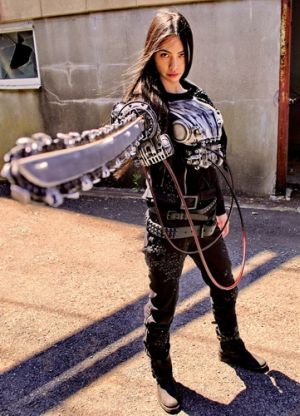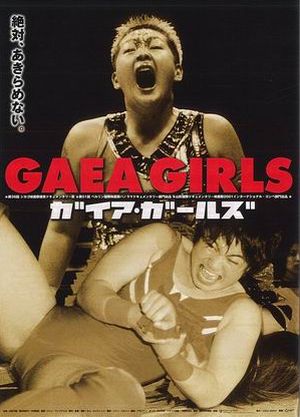★★
“Conclusive proof that more is not necessarily more…”
 I think I am officially over the whole Japanese uber-splatter thing. Either that, or I just don’t like Nishimura’s approach. He has been behind the last couple of examples I’ve seen (this and Tokyo Gore Police) and neither have reached the heights of te better genre entries. At 117 minutes, this is even more overlong than TGP and, to be blunt, I fell asleep before the end. Oh, there’s no lack of stuff going on, as we’ll shortly see, and certainly no shortage of arterial spray. However, neither of them make any significant impression, on either the emotional or visceral levels.
I think I am officially over the whole Japanese uber-splatter thing. Either that, or I just don’t like Nishimura’s approach. He has been behind the last couple of examples I’ve seen (this and Tokyo Gore Police) and neither have reached the heights of te better genre entries. At 117 minutes, this is even more overlong than TGP and, to be blunt, I fell asleep before the end. Oh, there’s no lack of stuff going on, as we’ll shortly see, and certainly no shortage of arterial spray. However, neither of them make any significant impression, on either the emotional or visceral levels.
Kika (Hara) comes home to find her father being eaten by her cannibalistic mother (Shiina) and uncle; Mom has designs of dining on daughter too. However, this is interrupted by a meteor which blows right through her chest. No problem: she’ll just rip out Kika’s and stuff it into the hole. Dust, apparently related to the meteor, spawns a zombie epidemic which forces the government to wall off the top half of Japan, though the zombies grow antler-like tumours, which are much in demand for the psychedelic high they induce when ground up and ingested. Meanwhile, Kika is rescued and given an artificial heart which also powers her chainsaw-sword. She is sent into the infected zone, along with her associates, to take out her mother, who has now become the queen of the zombies.
Yeah. Like I said, it’s not short on “stuff.” However, none of this is explored in any meaningful way, and the uber-low budget ($600K) is stretched thin, with most of it going on gallons of corn syrup and obvious latex prosthetics. There’s certainly no shortage of imagination on view – witness the vehicle made entirely out of zombies – but it’s operating in a vacuum, and it may be significant that the opening credits don’t appear until 40 minutes in. The fight scenes, while plentiful, are badly assembled and rarely memorable. The length here is less necessary, and more an exercise in desensitization, and long before the final mother-daughter confrontation, the arterial spray will have lost its impact.
Dir: Yoshihiro Nishimura
Star: Yumiko Hara, Eihi Shiina, Yurei Yanagi, Kazuki Namioka





 Out in the middle of the Japanese countryside is a square, unremarkable building that is the headquarters and training center for GAEA, one of the country’s leading women’s wrestling federations. Into this comes Takeuchi, making her second attempt to become a pro wrestler – the brutal training, under the glare of GAEA’s top wrestler Nagaua, caused her to give up last time. Will her second attempt prove any more successful? Can she get through to the final exam, and pass it to become a full member of GAEA?
Out in the middle of the Japanese countryside is a square, unremarkable building that is the headquarters and training center for GAEA, one of the country’s leading women’s wrestling federations. Into this comes Takeuchi, making her second attempt to become a pro wrestler – the brutal training, under the glare of GAEA’s top wrestler Nagaua, caused her to give up last time. Will her second attempt prove any more successful? Can she get through to the final exam, and pass it to become a full member of GAEA?